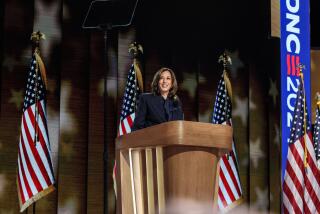DECISION ‘92: SPECIAL VOTER’S GUIDE TO THE PRESIDENTIAL ELECTION : THE RUNNING MATES: : GORE: Some still call him ‘Al Bore’, but the senator from Tennessee has brought political and legislative instincts to the Democratic ticket.
- Share via
WASHINGTON — Al Gore is a man on whom fate has showered an abundance of goods: good looks, good fortune and good timing.
Gore skipped from repeating his unsuccessful 1988 run for the Democratic Party’s presidential nomination, only to waltz onto this year’s poll-leading ticket as the vice presidential nominee. And he did it while appearing uninterested in higher office.
“I did not seek this nomination or expect it,” Gore has often said as he campaigns solo, stumping across the nation on behalf of Arkansas Gov. Bill Clinton, the party’s presidential standard-bearer. “But I am here to join this team because I love my country.”
Now, he is in a good position to contest for the top job--either in four years or in eight, depending on whether the Democrats win in November.
His feat, turning political ambition into humble servitude, has attracted notice in Washington.
“He elevated himself from an also-ran in ’88 to the reason many voters will vote Democratic in November,” said a not-very-admiring GOP onlooker. “If the Democrats win with Clinton at the top, he should fall on his knees to thank Gore for making their ticket palatable. If they lose, there’s no downside for Gore. He’s still in the Senate and he can still lay claim to being (Democratic presidential) front-runner in ’96.”
At times, Gore still shows flashes of his 1988 persona--when wags dubbed him “Al Bore.” His performance in the vice presidential debate, for instance, sometimes appeared didactic and wooden.
Some Gore-watchers wonder whether he will be able to subsume his ambition and play second-fiddle in a Clinton Administration--or whether the campaign-trail bonhomie the Democratic nominees displayed will survive. Some Gore aides whisper that their boss is more presidential than Clinton.
But no matter what the future holds, Gore brings clear assets to Clinton’s presidential drive. At 44, Gore has a proven record in Washington’s legislative arena.
His experience in foreign relations, the environment and emerging industrial technologies--all shortcomings for the man who would be President--also suggest he would play a critical advisory role in a Clinton Administration.
The Bush/Quayle campaign has aimed most of its fire at Clinton, but has saved some for Gore--notably, attacking his environmental prescriptions as radical and too costly and questioning his consistency on support for abortion rights. In their debate, Dan Quayle suggested that Gore changed his position for political reasons. Gore denies that--but he did write in a 1987 letter that abortion is “arguably the taking of human life.”
Before becoming vice president in 1980, George Bush also had supported abortion rights. But because Quayle and Bush now oppose abortion rights, making Gore’s position an issue seems doubtful.
A Vice President Gore would be likely to follow the recent tradition of activism, said Thomas E. Mann, director of governmental studies and a presidential scholar at the Washington-based Brookings Institution.
For example, he says, Walter F. Mondale in the Jimmy Carter Administration, Bush in the Ronald Reagan Administration and Quayle in the Bush Administration have expanded the office’s ceremonial role by acting as legislative battering rams.
Mann said Quayle has been powerful behind the scenes, owing to his strong following among hard-core GOP conservatives.
Mann added that Gore would come into office with a greater opportunity than Quayle to influence a Clinton Administration because, “Gore would begin with a presumption that he brought something to this election.”
In naming Gore as his running mate, Clinton chose a virtual replica of himself in many ways. Both are baby boomers, Southern born, with political philosophies and attitudes that tilt slightly right of the Democratic center.
The choice of Gore added about two points to Clinton’s popularity, Mann said. “But it did more than that because it added a tremendous boost to the (Democratic) convention that can’t be measured in the polls.”
In fact, some have suggested that Gore should lead the ticket today, noting a single-mindedness that may be lacking in Clinton’s eager-to-please personality.
Campaign aides have said privately that Gore’s personality suggests he may be more unflappable than his running mate. Whereas Clinton has on occasion flashed a hot-headed streak during the presidential campaign, Gore has kept on an even keel, rarely revealing himself and never straying from the campaign’s daily message.
“I think Gore, as vice president, will act as presidential as (Clinton) himself, if we get that far,” one of Gore’s top traveling aides said. “That’s a good thing to have in a vice president, but it would be better to have that cool temperament in a President.”
As he announced his choice, Clinton described his running mate as though he were talking about himself, saying Gore “has what it takes to lead this nation from the day we take office.”
Campaign watchers have hedged their bets over how the Clinton-Gore relationship will endure the inevitable differences that would follow, if the Democratic duo wins.
Noting that both Clinton and Gore are driven and ambitious, one ranking Democratic Party official suggested that tensions may lie ahead. “Both men believe they’re smarter than most people and both think they deserve to be President of the United States,” the party official said. “But since only one can sit in the Oval Office at a time, can Gore wait his time?”
Staff writer Edwin Chen contributed to this story.
More to Read
Get the L.A. Times Politics newsletter
Deeply reported insights into legislation, politics and policy from Sacramento, Washington and beyond. In your inbox twice per week.
You may occasionally receive promotional content from the Los Angeles Times.










